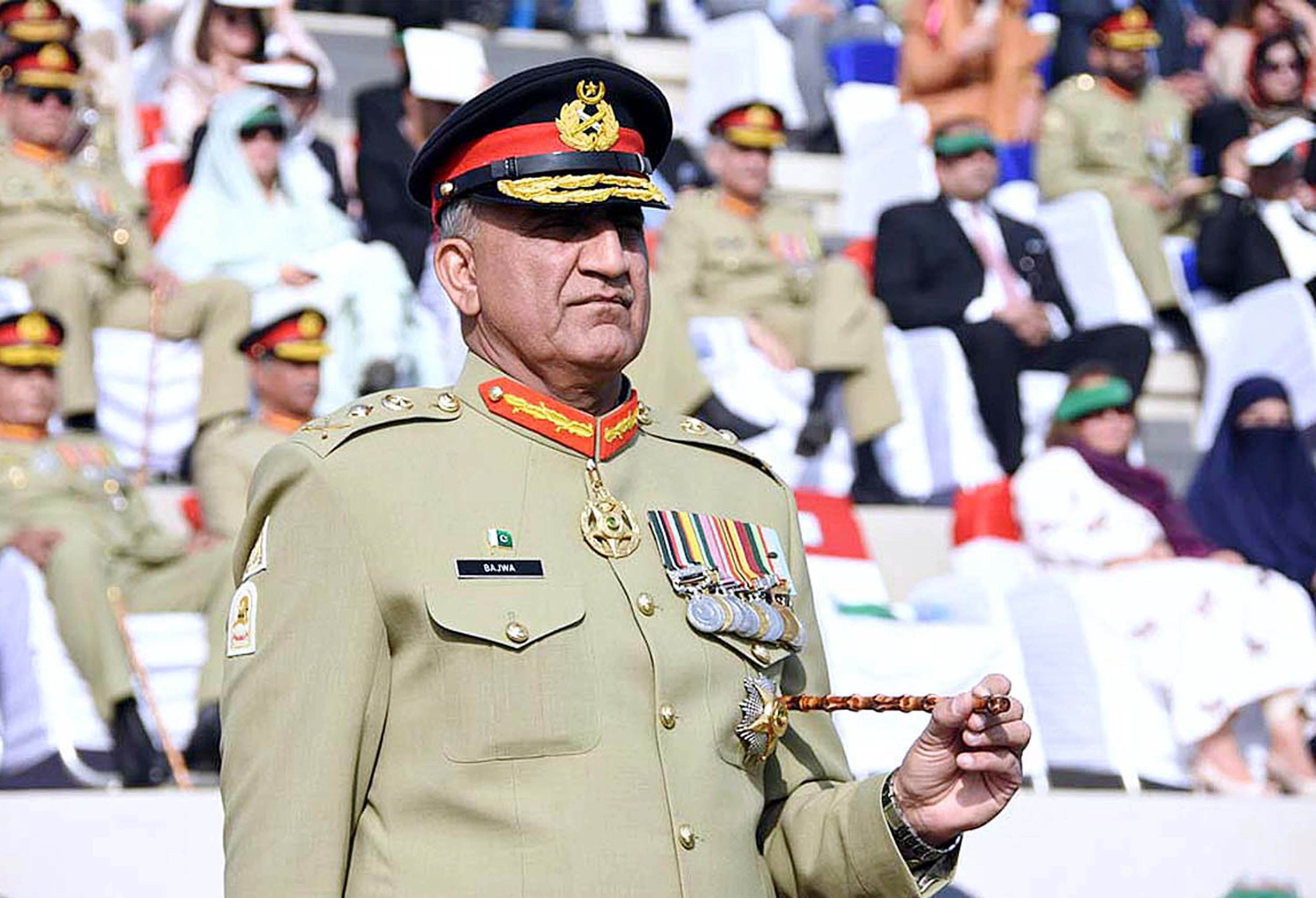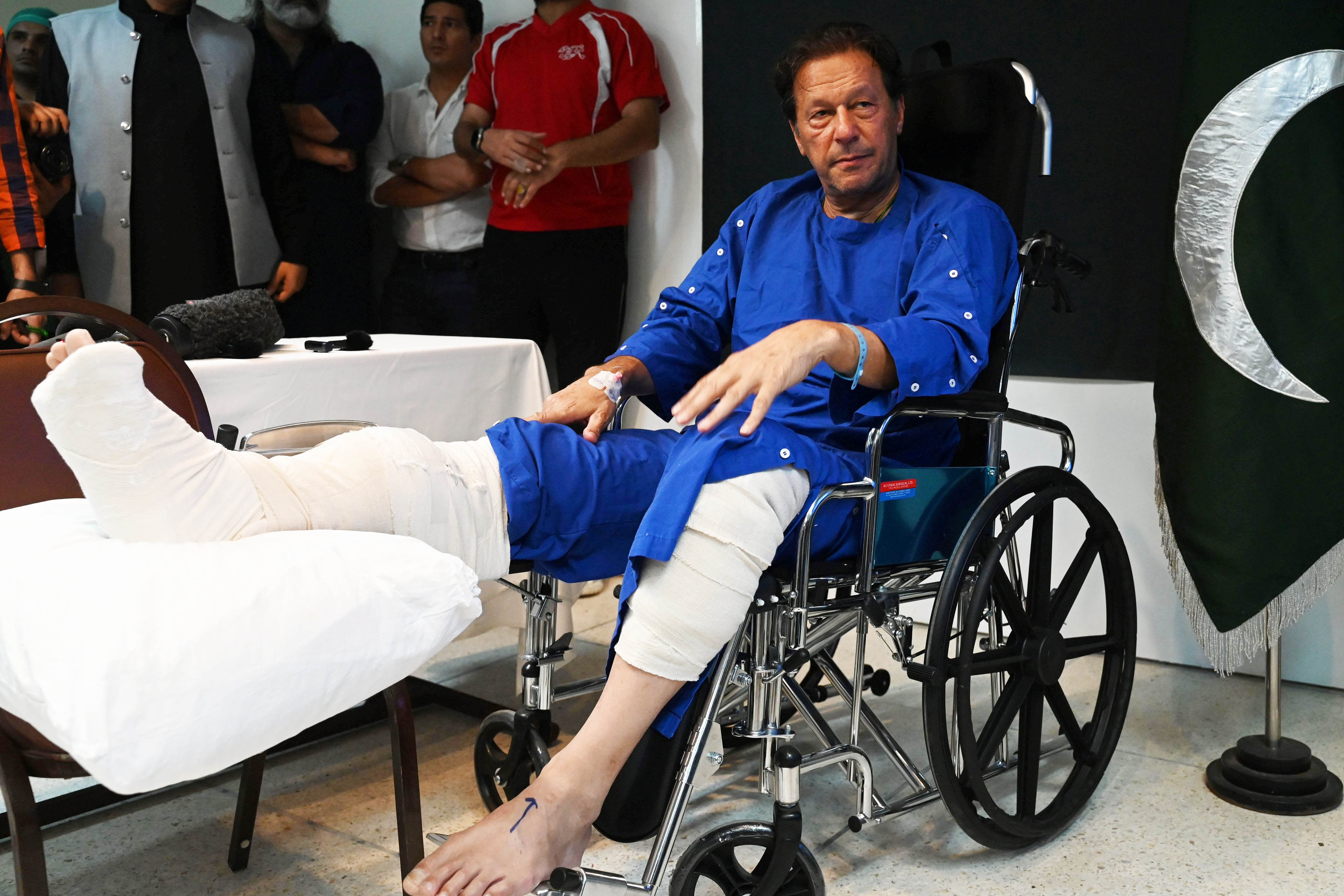
Pakistan Army chief Gen Bajwa has stressed that the army would remain politically neutral even as ex-PM Imran Khan resumes the long march after recovering from the gun-shot injuries he received in alleged assassination bid on him
With the date of the superannuation, November 29, of the army chief, General Qamar Javed Bajwa, drawing closer with each passing day, hectic parleys are underway in London, Rawalpindi and Lahore. While the Pakistani PM, Shehbaz Sharif, who had made an impromptu visit to London just after the session of the Climate conference at Sharm-el-Sheikh in Egypt on November 6, now has returned home, perhaps, much more determined to tackle ex-PM Imran Khan’s ongoing agitation. His brother and a three-time prime minister, Nawaz Sharif, has asked Shehbaz to take a tough line against the agitation.
Meanwhile, Gen Bajwa presided over the meeting of 23 three-star generals, including army’s corps commanders, reiterating that the army would remain politically neutral and stand by the civil authorities; it has no intention to impose martial law or undermine the constitution, it was further resolved. If Khan’s agitation becomes violent, the civil authorities would be assisted by the Pakistani Rangers. It was also noted that the police from Sindh have already arrived in Islamabad.
Nawaz Sharif was deposed with the connivance of the army and the higher judiciary just before the elections in 2018, thus paving the way for Khan as and his party to win the polls. Apart from instructing Shehbaz to take tough line against Khan and asked him not to relent on the issues such as ordering an early elections much before the end of the present tenure of the Pakistan National Assembly, extending Bajwa’s tenure on the plea that the new chief should be decided by the new PM after the polls.
With General Bajwa reiterating that he would not seek or accept any extension as the army chief, the generals’ conference has decided that after November 20, the names of three senior most generals should be sent to the prime minister through the defence ministry. The senior most generals are Sahir Shamshad Mirza, Azhar Abbas and Nauman Mehmood Raja, president of the National Defence University. Faize Hamid is among the junior most officers in this list.
Shehbaz Sharif, who is empowered to appoint the new chief, would be deciding the new chief; but the situation continues to be unpredictable. The army veterans have demanded that the appointment of the new army chief should be done after the polls only. The main reason for this uncertainty could be attributed to the martial laws imposed on the country, a civilian government could never complete its five-year term.
In Pakistan, it has been the army taking the key decisions on the key issues. Seldom, they are taken into confidence whether Pakistan should give nuclear know-how to North Korea or should be producing the dirty bomb in collaboration with Ukraine.
The rise of Imran Khan in politics has exposed new dimensions in the country’s politics. His multi-dimensional blitzkrieg against his political adversaries appears to have outwitted his rivals, as well as stunned the political analysts and observers. Following the assassination attack, he now occupies the centre-stage of Pakistan’s national politics. If polls are held immediately, he is poised to trounce his political rivals, a fact known to his political opponents making them nervous.
President’s Role

There are reports that before Khan’s decision to resume his march towards Islamabad, President Arif Alvi had secret parleys regarding the appointment of new army chief with Khan in the hospital, where he was being treated for his gun-shot injuries received on November 3. It is also stated that Alvi had met Lt. General Faize Hamid, one of the generals seeking the coveted position at a private residence in Lahore. Earlier, he reportedly had facilitated meetings between Khan and Bajwa requesting him to accept extension till the new polls scheduled in 2023 are held. Shehbaz Sharif has rejected the suggestion, but it cannot be ruled out that he might reject the proposal or delay it, thus, a new constitutional and institutional crisis might hit the country.
Bajwa nonplussed
The army chief, Bajwa appears to be nonplussed regarding the ongoing political developments. He is making farewell visits to different army centres. Before demitting the office, he has rekindled the defence ties with the Pentagon, and has got huge financial and defence assistance. It is also reported that in lieu of this bonanza for his resource-starved country, he has quietly committed massive defence cooperation with Ukraine. It could include the two countries cooperating in the development of ‘dirty bombs’ i.e. explosive unleashing radioactivity, as alleged by Russia. The Pakistani foreign office has promptly rejected this charge levelled by a senior Russian functionary, Irgor Morozov, before a media channel, but few take this denial seriously. It is quite well known in the international arena that neither Shehbaz Sharif nor his foreign minister, Bilawal Bhutto Zardari are privy to the army’s such deals. Earlier, the civilian leaders were seldom allowed to share such information. Meanwhile, India is not totally unaware of the fact that recently Mohammed Zahoor, a Pakistani businessman in Ukraine, has recently bought two fighter planes for Ukraine. He has reportedly been playing a key-role in promoting the ongoing defence ties between the two countries.
Meanwhile on the home front, Bajwa has adopted a ‘tolerant posture’ towards the young agitators of Imran Khan’s procession. They are heard hurling personal abuses, but he has instructed no covert or overt action against them. It has enabled him to present himself as a tolerant military officer, thus shedding off the blame for installing a hybrid government under Khan in 2018. Similarly, the accusation that the army had connived in ousting Khan’s Pakistan Tehreek-i-Insaf (PTI) government in April, 2022, has not been convincing enough for the common people. A sizable number of them appreciate the army’s new non-political avatar. The army or ISI could have taken strong action against such hooligans, but they have maintained restraint just requesting the civilian government led by the PTI in Punjab to take appropriate action under the law, thus further establishing GHQ’s new found love for democracy before its citizens.
Struggle for Civilian Supremacy!
Interestingly, the armed forces have always been accused of interfering in the country’s politics, but in the ongoing political drama, the ruling coalition led by Shehbaz Sharif as well as the country’s main opposition, PTI, are vying with each other yearning for the love from the GHQ. They seek support and confidence from the armed forces in this struggle for power.
The genesis of the ongoing political confrontation can be traced to the ‘internal power struggle’ within the GHQ. Both Bajwa and the then ISI chief Faize Hamid had ensured electoral success of Imran Khan during the 2018 National Assembly polls. In 2019, Bajwa asked for a three-year extension, which needed new legislation, and for this Bajwa had to seek the support of the two main political parties, PML-N and PPP; these two out-fits army wanted to destroy with the help of Khan for containing to their respective political clouts. However, by helping Bajwa to get extension, the army chief’s relations with them improved significantly. Finally, the army became neutral in the struggle for power and refused to interfere in the fall of the Khan government, when it lost no confidence motion in April this year. Apart from the improvement of the GHQ relations with the PML-N and the PPP, the army was blamed for the poor performance of the Khan Government it had imposed on the people. During the Pakistan Democratic Movement (PDM) rallies, the army’s political role was being scanned and criticised. Thus, finally, the army declared itself ‘politically neutral’.
This changed stand has earned the wrath from Khan and his party, PTI. Khan was keen to retain the office of the prime minister till November 30, to enable him to elevate his confidant, Faize Hamid, as the new army chief. Since Faize Hamid and Bajwa had ensured his victory in the 2018 elections, he expected that this ‘co-operation’ should continue in future too.
Khan’s political management
Imran Khan, a cricketer turned politician, who had won the World Cup for his country in 1992, initially was considered a novice in the country’s public life. Since, April 10, this year, when he was ousted from power through a no-confidence vote in the National Assembly, he appears to have outwitted the country’s heavy-weight political leaders across the political spectrum. He now successfully occupies the centre-stage of Pakistan’s murky politics.
He amazes political commentators and analysts across the continents, when he could publicly criticise the army chief, Qamar Jawed Bajwa, his mentor, thus winning the heart of democracy-loving people of a nation, which has been a ‘garrison state’ since its inception in 1947. He was wounded, when fired at on November 3, but uses it as yet another opportunity to malign the government and those who do not belong to the gang of his supporters at the GHQ. He asks the police of Punjab, a province under the rule of his party, PTI, to file an FIR against Prime Minister, Shehbaz Sharif, Interior Minister, Rana Sanaullah Khan , and Director General of Inter-Services Intelligence (ISI), Maj Gen Faisal Naseer, but the request was not complied with. However, the Supreme Court intervened and ordered the FIR to be lodged against the three accused. Khan again hits the headline.
In a bid to dilute the political impact of the firing on Khan, the beleaguered federal government under Shehbaz Sharif requested the issue should be tackled by a full bench of the Supreme Court. The apex court’s intervention again put Imran Khan as the only leader in the public domain.
Interestingly, the complainant and the authorities very well know that the FIR has little legal value because in this medico-legal case, the necessary protocol was not adhered to, which must have been followed under the criminal procedure. After being wounded in the firing, Khan should have gone to a nearby government hospital in the Gujranwala for completing the medico-legal procedure, and the FIR could have been automatically registered, but he chose to drive another three hours to Lahore to get treatment in the Shaukat Khanam Cancer hospital. The accusation may not be able to sustain the judicial scrutiny, but in public perception, he has successfully put the PM and his key minister in the dock.
The Islamic Card
In Pakistan’s four provinces, Khan’s party, PTI, has a significant presence. It governs Khyber Pakhtunkhwa (KPK) and Punjab, and is the main opposition party in Sindh. It also has significant representation in Balochistan. In the KPK, it works in cooperation with the ISI and Pakistani Taliban to contain the political influence of Awami National Party led by Asfandyar Wali Khan, scion of the legendary Frontier Gandhi Abdul Gaffar Khan. He has been accusing Imran Khan and his party, PTI, responsible for the killing of hundreds of members of the ANP in Karachi and Peshawar areas. The PTI is known to be in hand and glove with the Tehreek-i-Taliban Pakistan (TTP)
During his tenure as PM, Imran Khan, like his predecessors, has never hesitated in using Islamic card for political purposes, though in his personal life, the religion has a little role. It appears that he ardently follows his predecessors such as Z.A. Bhutto, who had declared the Ahemdias as non-Muslims by amending the constitution. Nawaz Sharif during his three innings as the PM had introduced Sharia Law in the country. Therefore, it is not surprising that he calls Osama bin-Laden, world’s most feared terrorist, as the martyr in the National Assembly, and leads the festivities welcoming the American departure from Afghanistan on August 15, 2021.
Khan, who emerges as a charismatic leader, leads a political outfit, PTI, created by the country’s secret police, Inter-state Intelligence (ISI). Being a successful cricketer, he knows how to use each ball to hit the boundary! And he does it in the country’s politics. He accuses America of being behind his ouster from power in April this year, but engages a public relations company to lobby for him in Washington!
Imran Khan, a living icon for the youths of his country, was being groomed by the Pakistani army to become the civilian face of a ‘hybrid regime’, in which the army rules without imposing martial law. It appears that Khan is still committed to this agenda of marginalizing the country’s two mainline political parties, PPP and PML-N, but the GHQ under Bajwa appears to have abandoned the agenda.
It is true that both the PPP and PML-N were born in the nurseries of the ISI, but over the years, these political outfits had become assertive, quietly challenging the hegemony of armed forces in the country. It, however, negates the role of the army believed to have been entrusted by the outgoing imperial power, Britain. According to a Sweden-based political scientist, Ishtiaq Ahmed, who has authored, ‘Pakistan: the Garrison State’, the outgoing British power had ensured that the army should have the main role in the new state carved out from Mother India to serve the geo-political interests of the erstwhile colonial powers, later represented by USA.
He asserts that being unsure of a united India’s support under Mahatma Gandhi and Jawharlal Nehru to the erstwhile colonial powers; it became imperative for the outgoing imperial power to set up a vassal state. Pakistan’s decision to collaborate with Ukraine in its ongoing war with Russia further proves that it continues to serve the West’s strategic interests. The resumption to financial assistance to Pakistan is not just a reaffirmation of the close ties between the Pakistani army and Pentagon, but it will be matter of little surprise, if Pakistan sends its Jihadists to Ukraine against Russia soon.
How Imran outmanoeuvred his rivals
The story of Imran Khan-‘the enfant terrible’ is just a new political experiment for those closely watching the ongoing political developments in Pakistan. He is keen to push Pakistan towards martial law but so far, the army chief, Bajwa and PM Shehbaz Sharif have successfully thwarted the game. The federal government in Islamabad and the GHQ at Rawalpindi finally breathed a sigh of relief on the night of Thursday, November 3, 2022, when the news of the survival of Pakistan’s former PM Imran Khan, reached them. He was hit by two bullets at the Allah Wala Chowk in Wazirabad in the Punjab.
With the arrest of the assassin on the spot, there is now no mystery in this murderous attack to be unfolded. However, it is being debated on television channels regarding the motive of this attempt on Imran’s life enhancing their TRPs (television rating points), but without adversely affecting Imran’s political windfall.
Imran Khan, thus, has proved himself an avant-garde. He continues to outsmart his political peers, establishes his genius as a politician.
He is really the “enfant terrible” for his mentors in the ISI and the GHQ. He is unconventional and clever and ready to overwhelm Pakistani politics.
Can Alvi throw a spanner
Lt. General Faize Hamid, the corps commander of Bahawalpur, and former Inter-Services intelligence (ISI) chief, is in contact with Arif Alvi, and Imran Khan.
It cannot be ruled out that Alvi may delay the appointment of the new army chief proposed by the Shehbaz Government, but the PDM has decided to hold a joint session of the National Assembly and the Senate for ratifying the proposal. Alvi is being outwitted again, when he had refused to swear-in Shehbaz Sharif as the new PM.












